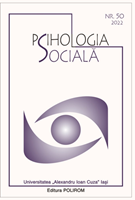Mecanisme cognitive implicate în acceptarea teoriilor conspiraţioniste
Cognitive mechanisms involved in accepting conspiracy theories
Author(s): Gerard StanSubject(s): Media studies, Theory of Communication, Social psychology and group interaction, Cognitive Psychology, Social Theory
Published by: EDITURA POLIROM S.A.
Keywords: conspiracy theories; conspiracy ideation; cognitive bias; need for cognitive closure; cognitive complexity; motivated reasoning; intellectual autonomy; reflective beliefs;
Summary/Abstract: Omnipresent in the contemporary media landscape, conspiracy theories are defensive epistemic reactions of an in group, determined by the threat of so called malevolent actions by an out group. The acceptance of conspiracy beliefs involves cognitive mechanisms, ego protection mechanisms, social mechanisms and, certain mechanisms of public communication. The main purpose of this article is to explain the cognitive mechanisms, conscious and unconscious, involved in the acceptance of conspiracy theories. Even if it is impossible to isolate a dedicated cognitive mechanism, I argue that the fixation of conspiratorial beliefs results from the alignment of cognitive dysfunctions, favored by socio historical contexts that generate uncertainty. I examine how some cognitive biases, but also several parameters of conscious and intentional cognition – the need for uncertainty reduction, the intentional and conscious search for patterns, the need for cognitive closure, the need for cognitive complexity, and the need for unfalsifiable explanations – determines the motivated reasoning that is constitutive of a conspiracy theory. Finally, I argue against under standing conspiracy theories as epistemic indicators of a so called intellectual and social collapse of humanity. A small number of subjects who accept conspiracy theories end up being subjugated by the conspiracy ideation and acting on it.
Journal: Psihologia socială
- Issue Year: 2/2022
- Issue No: 50
- Page Range: 145-156
- Page Count: 12
- Language: Romanian
- Content File-PDF

